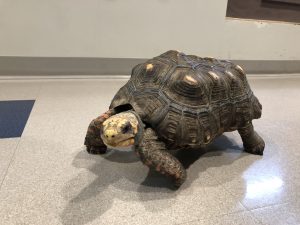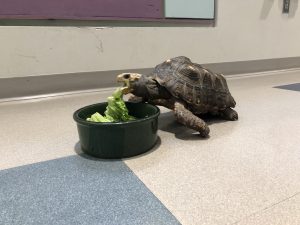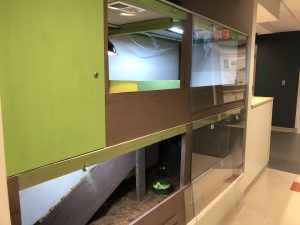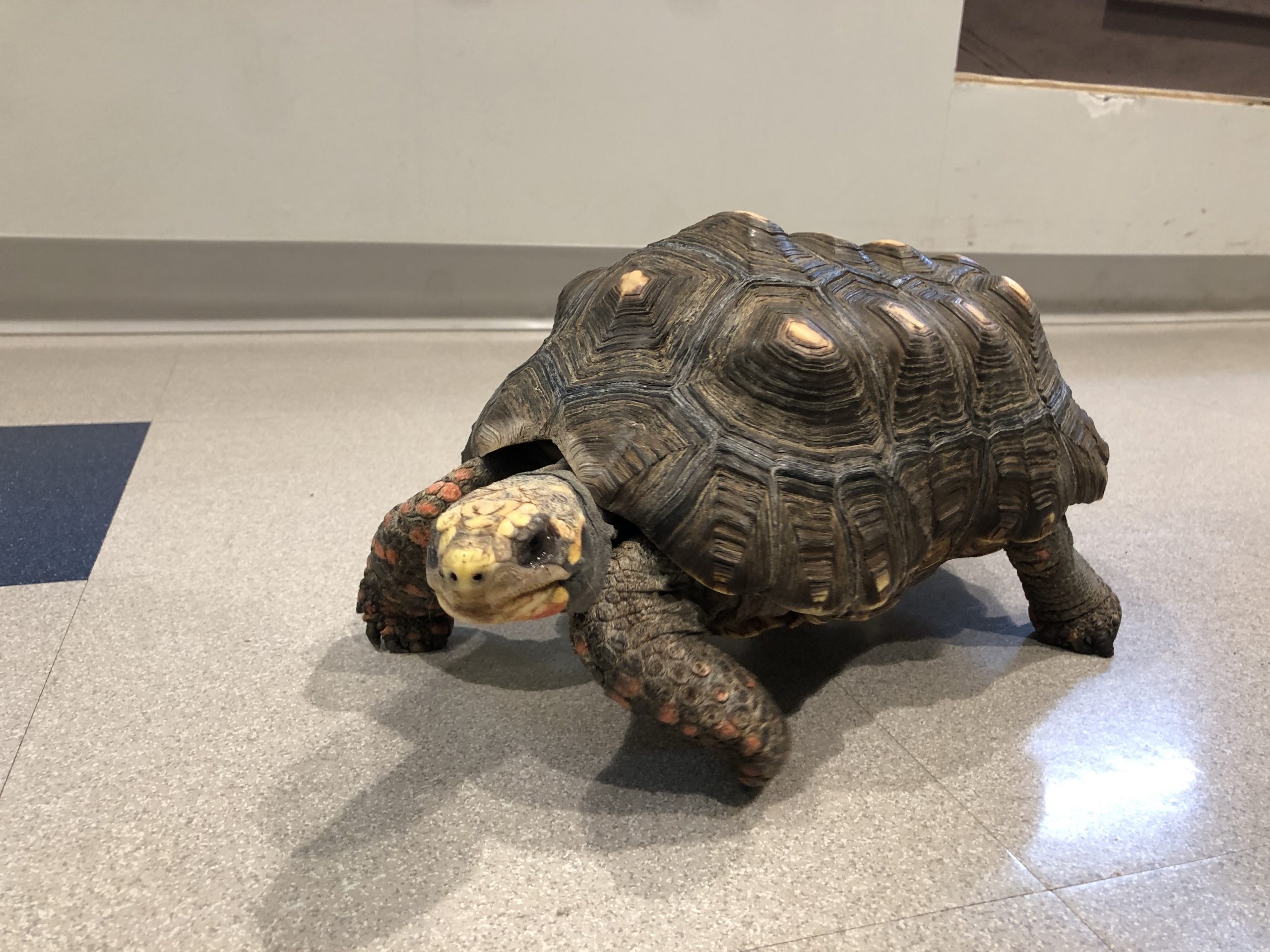When walking through the halls of the Integrated Sciences Center, a special creature may catch your eye — a red-footed tortoise to be exact. He is better known as Gödel the Turtle.
Over Thanksgiving break, Gödel’s (pronounced like ‘girdle’) habitat, along with surrounding habitats, was redone by EACH, the Exotic Animal Care and Husbandry club on campus. The mission of the club has two components, says biology professor and EACH advisor Krys Strand.
“One is to provide opportunities for Concordia students who are interested in getting that experience with exotics, and another goal is to do some outreach,” Strand said.
EACH teaches about the care of exotic animals, a category of pets that are often bought or adopted without much research, leading to a lack of proper care.
“We strive to provide outreach to educate people on proper husbandry, and why taking care of the animals properly is important,” said Eliana Rutherford, a junior biology student and member of EACH.

Outreach to the public comes in many forms for the club, ranging from providing a unique opportunity for visitors, to hosting events for students.
“Sometimes those encounters spark some interest and get people more aware of conservation and caring for these critters,” Strand said.
A goal of EACH is to create opportunities for students at Concordia to interact with the animals. They hope to facilitate study sessions with Gödel or a documentary night with one of the various snakes the club takes care of.
The rise of COVID created challenges for the caretakers of the animals. Due to limitations on the number of people who could enter the workspace, it was harder to interact with the animals in the capacity they would have liked.
“Because fewer people handled the animals, they are less socialized. Now we’re getting them back to where they were before. COVID was very hard on Godel, he was very lonely,” said Emma Ericksen, sophomore environmental studies student and vice president of EACH.
Gödel acts as the unofficial club mascot, Strand said. Many EACH members noted how much the tortoise is like a little dog.
“He will follow you around, he will sit in your lap, and he loves scratches and attention,” said Ericksen.

Another impact of COVID was having to move the animals from their public enclosures to a private space.
“Because of COVID, we tried to reduce the number of students gathering in groups, so we moved them into the lab,” said Zimy Le, president of EACH.
As it becomes safer for students to gather near the enclosure spaces and for the animals to be interacted with, the critters are being moved back into their public displays.
Part of the transition back into public display meant renovating Gödel’s habitat to better serve his needs. When the ISC was remodeled, the tortoise’s space was smaller than the club had intended for it to be. The solution to this, Rutherford discovered, was to build a double-decker habitat, which includes a ramp for Gödel.
However, tortoises do not know how to climb on their own, but Rutherford found a solution for this as well.
“Over the summer I was working with him to learn how to climb. We did a lot of experiments like at what angle he could climb at,” said Rutherford.
Now, Gödel gets his exercise climbing between floors of his habitat. Another challenge in renovating the tortoise enclosure was taking into account all the needs of Gödel.
“It does take a while to maximize the use of the space, consider how the habitat needs to be constructed for each animal, and what is the best way for the public to view the animals,” Dr. Strand said.
The club also took into consideration the various cost factors of the remodel.
“All of the enclosures are built from scratch. They’re sustainable and we can reuse it and it doesn’t cost that much,” Le said.

Gödel wasn’t the only lucky critter to get a new enclosure during the remodel. Marv, a bearded dragon, grey tree frogs, and red-eyed tree frogs also got a new space next to Gödel. EACH’s next plan is to reintroduce their box turtle and Russian tortoise to the public habitats. Final touches are also being added to each enclosure, including decor, enrichment for the animals, and information boards.
The benefits of the public habitats, the members of each said, are numerous.
“Animals bring a lot of enrichment to lives, and especially as students who are really stressed out, just having an animal that you can watch and see really helps overall,” Rutherford said. Walking through ISC and being able to stop and say hello to a critter is a treat they will not take for granted following these pandemic years.
The team members of each all welcome new students to join the club. As they look to expand their number of animals, more caretakers will be needed to complete the many tasks that come with fostering exotics.
“We are definitely looking for more students to be involved. We really need students who are interested, dedicated, want to learn, and who have a positive attitude,” Strand said.
The club is especially looking for students who remain in the Fargo-Moorhead area over breaks, when help is harder to find. Being a biology major is not a requirement, and being a caretaker can be worth credit, a program which includes ethics and animal care training as well as a special project. EACH membership can include shadowing a current caretaker or being trained to take caretaking shifts.
Just as much as the members of EACH take care of the animals, the animals provide their own care. The companionship offered by animals, no matter their size, is one of many gifts, Ericksen said.
She said one of those small perks she gets from working in the animal room is that her eyes become open to different perspectives.

